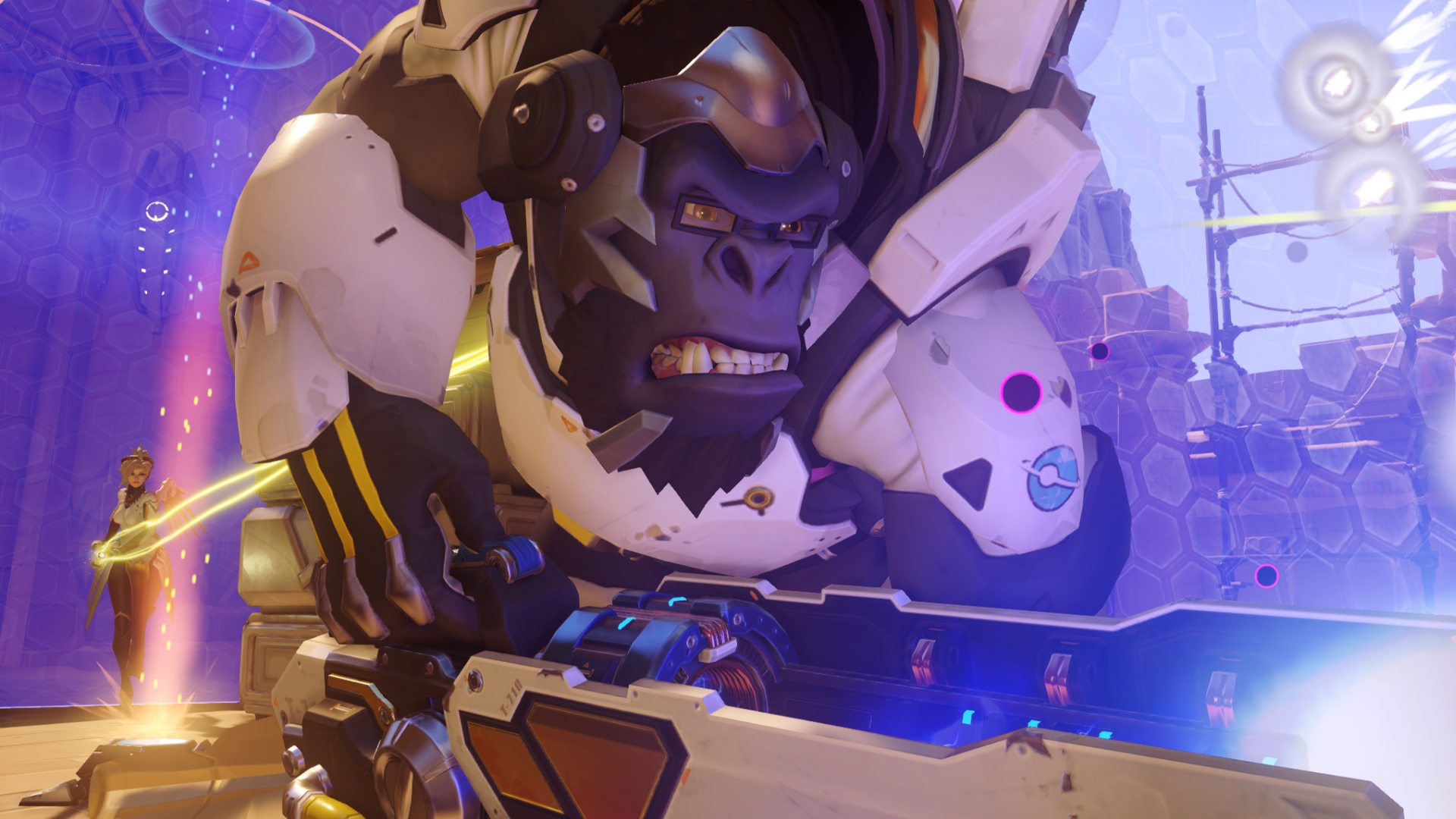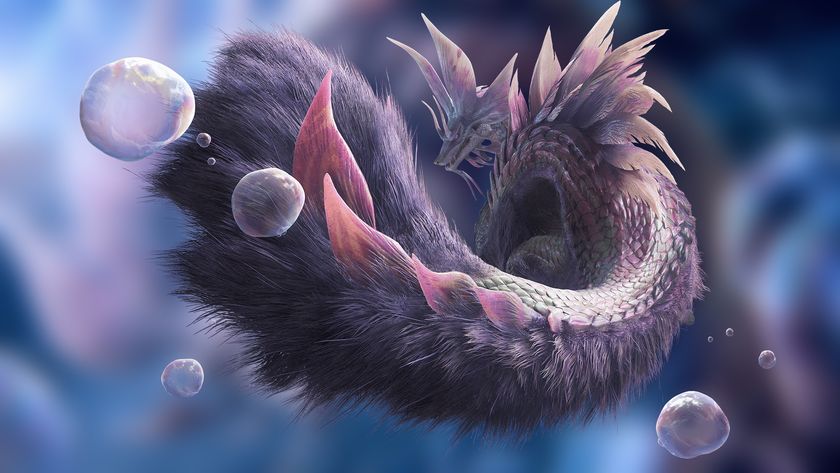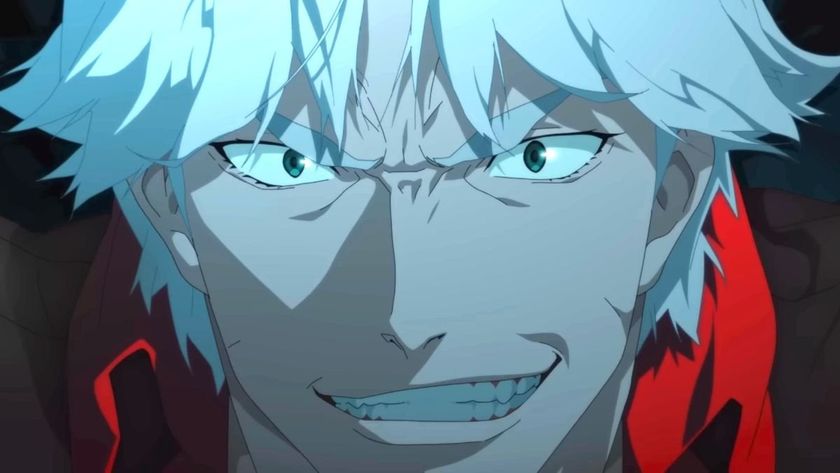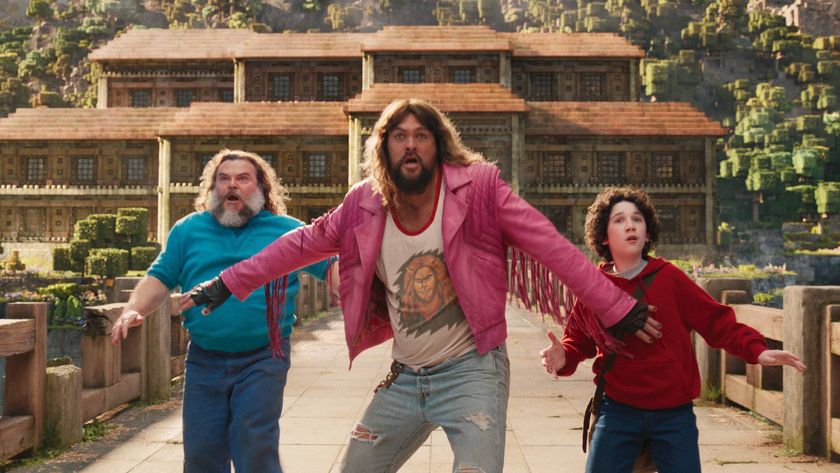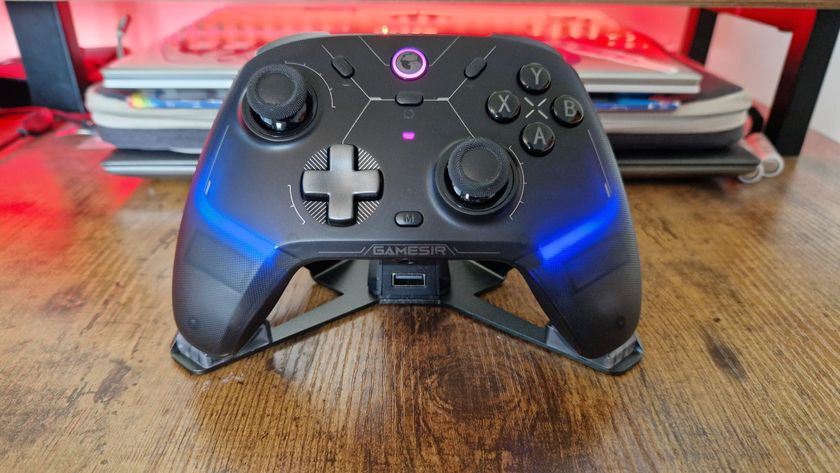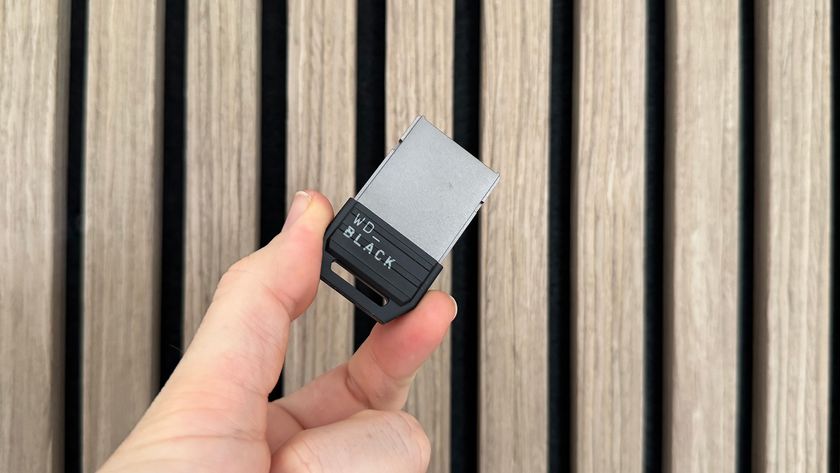12DOVE Verdict
There's certainly room for improvement, but Overwatch is already a superb team-based shooter full of memorable multiplayer moments.
Pros
- +
Stellar presentation and polish
- +
Unique, lovable hero designs
- +
Win or lose, you're always eager for the next match
Cons
- -
Uneven map layouts
- -
Some frustrations inherent to team-based multiplayer
Why you can trust 12DOVE
Thanks to Overwatch, I think I finally understand what avid sports fans feel when they're screaming at their favorite team. Take away the context, and irate cries of "WHY CAN'T WE CAPTURE THIS POINT?!" have the same disgruntled ring to them as "HOW DO YOU NOT CATCH THAT PASS?!" Deep down, though, we rage because we genuinely care. No matter how indignant you might feel in that brief moment, your love of the game keeps you coming back, time and again. Overwatch isn't perfect, and it's just as susceptible to bouts of frustration as any other team-based competitive experience. But the bottom line is that this is a fantastically well-made multiplayer FPS, rich with personality, full of exciting gameplay possibilities, and gleaming with polish. The fun and enjoyment Overwatch delivers are well worth the occasional flash of enmity.
In the most simplistic terms, this is a 6v6, objective-based, multiplayer-only team shooter, putting you in the shoes of the charismatic heroes and villains of a superhero-filled future. Asymmetrical standoffs between offense and defense define three of the four modes: Assault sees teams duking it out to capture/deny control points, players must push alongside a payload in Escort mode, and Assault/Escort combines the two. The outlier mode is Control, where players fight over a single capture point in a best-of-three on multiple, mirrored map layouts. You can swap your character choice at any time (with multiples of the same hero allowed) during the satisfyingly speedy matches, which average around 10 minutes. The focus on objectives in every mode makes for a fairly accessible foundation - and when it comes to the presentation of that core concept, Overwatch is a marvel.
This is easily one of the most aesthetically pleasing games currently in existence, where Pixar-grade character models move swiftly and sharply across picturesque, visually stunning vistas from around the globe. Every animation exudes charm and dynamic energy, and the use of vibrant, saturated colors in both the hero and map designs is a treat for the eyes, like the optical equivalent of snacking on rainbow sprinkles. Whether you're playing on PC or console, the framerate is rock solid, and the controls work just as well on a gamepad as they do on a mouse-and-keyboard combo (minus the latter's superior aiming). The soundscape is also phenomenal, with heroes spouting plenty of quotable lines that convey a tasty morsel of backstory or telegraph their most powerful abilities (without getting on your nerves, thank goodness), all backed by grandiose music that surges with the ebb and flow of each match.
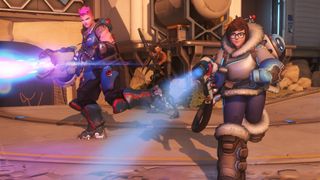
Each of the 21 heroes at launch (with more promised for free in the future) is brilliantly designed, all dissimilar in appearance but universally appealing in their own ways. It's a bit like the cast of a fighting game: everyone on the roster is bound to be somebody's favorite, both in terms of personality and playstyle. And like a fighting game, everyone has a handful of unique abilities, attributes, and weapon types that you'll need to be aware of before you're prepared to take on all comers. Heroes are grouped into one of four categories - offense, defense, tank, and support - but they're all malleable enough to serve a wide range of functions in the hands of a skilled player.
I love using the rocket-blasting, jetpack-boosting Pharah to hold down a fort, while defense-oriented heroes like the weasley demolitions expert Junkrat or friendly frost maven Mei can be utterly devastating on the attack. There are also some cleverly inventive takes on familiar roles: D.Va's a tank who's incredibly vulnerable when she's not piloting her sturdy mech, Zenyatta can support while dealing lethal damage in duels, and Widowmaker's firearm doubles as an assault rifle when she's not trying to snipe targets from afar. Everyone on the roster has the kind of 'minute to learn, lifetime to master' design that encourages you to adapt to a variety of distinct playstyles, and the way heroes naturally complement and counter one another means there's an answer to every brilliant team composition you can think of.
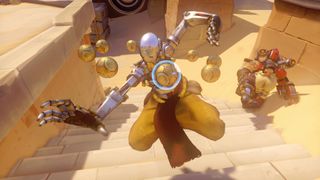
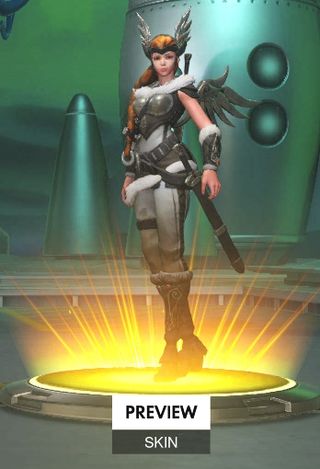
There's a swath of unlockables accompanying every hero in Overwatch, ranging from the mildly amusing (nifty sprays, victory poses, new lines of dialogue) to the truly coveted (skins of varying rarity and new heroic intros to preface your Play of the Game). Unlocks are purely cosmetic, thank goodness, so they offer no tangible benefit besides making you feel cool. All items are contained in loot boxes, which you earn each time you level up - but you do have the option to buy more for cash-money if your collector's tendencies start to kick in (which they almost assuredly will, given how excellent some of those Legendary skins look). Be warned: you might find yourself unable to resist dinging your wallet to expand your collection of spiffy unlockables. Just make sure you don't go overboard.
That said, all the ingenious designs in the world can't override that constant of competitive multiplayer: your team's cohesion will usually determine how much fun you have. Sometimes, you'll be part of a balanced lineup, with players who communicate effectively via party chat or the handy radial menu for tactical cries (and adorable emotes). Other times, you'll be desperately trying to make progress while your team fails to get its act together. By contrast, Team Fortress 2's 12-vs-12 skirmishes afford some room for self-centered or uncooperative jerks on either team, because a core group of coordinated players can still keep their focus on the objective and win the day. But, similar to the MOBA genre, it's much harder to compensate for dead weight on Overwatch's small teams.
Uneven map layouts tend to magnify any team imbalances. While every locale boasts a gorgeous aesthetic, their segmented designs are filled with chokepoints, vantage points, and distant respawn points that feel like they heavily favor one team over the other. This can lead to a very swingy, not always satisfying pace: If the offense is too strong, the match comes and goes without any tension, and when the defense is dominating, opposing players will feel like they're hopelessly stuck and just waiting to lose. While most maps have multiple pathways and plenty of vertically-scalable scenery that makes for interesting skirmishes, these alternate avenues are too far off the beaten path and end up feeling underutilized. And unless you're organizing a Custom Game, you don't have any say in which mode or map you're plopped into once you jump into the Quick Play queue. Overwatch's swift matchmaking does an excellent job of keeping players around a 50% win rate, but there will inevitably be times when you're mismatched against far better or far worse players, and one side is going to feel incredibly demoralized afterwards.
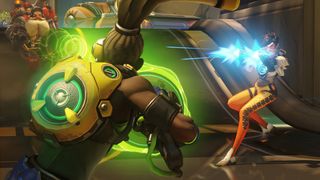
Thankfully, that fleeting feeling of defeat melts away in the afterglow of an uplifting victory. Overwatch also does an outstanding job of commending little victories, encouraging players to bestow kudos upon enemy and ally alike for their noteworthy contributions (healing and damage done, objective time, etc.) at the end-of-game screen. The piece de resistance of player celebration is Play of the Game: a brief replay highlight showing off someone's crowning moment of glory, regardless of which team took the match. The Play of the Game's algorithm could do with some tweaking, as it has a habit of picking out unimpressive or predictable plays as often as exceptional displays of skill. But every time you're the one in the spotlight, it's an absolute thrill (especially when you could feel yourself turning the tide in the moment, only to be validated post-match).
That's what makes Overwatch tick: you're always eager to be a part of the next big play. Whether it's a small victory, like narrowly saving an ally's life, or a pivotal ultimate that lets you obliterate the opposing team and secure the final objective, Overwatch is ripe with the kinds of memorable moments that define worthwhile multiplayer. The online arena often lends itself to emotional extremes, with lofty highs in victory and deflating lows in defeat; Overwatch is no exception to that steady fluctuation of moment-to-moment enjoyment. But ultimately, even in those brief instances when you're convinced you hate facing off against a given hero, or loathe the capture point you just can't seem to lock down, you're continuously playing Overwatch for the love of the game.
This game was reviewed on PC and PS4.
More info
| Genre | Shooter |
Lucas Sullivan is the former US Managing Editor of 12DOVE. Lucas spent seven years working for GR, starting as an Associate Editor in 2012 before climbing the ranks. He left us in 2019 to pursue a career path on the other side of the fence, joining 2K Games as a Global Content Manager. Lucas doesn't get to write about games like Borderlands and Mafia anymore, but he does get to help make and market them.
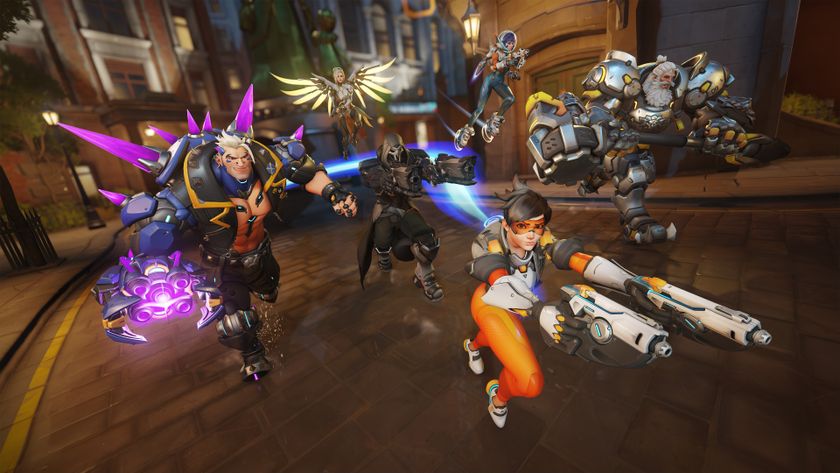
Marvel Rivals isn't going anywhere, so Overwatch 2 is stepping up with game-changing perks and a new mode that borrows from Counter-Strike and League of Legends
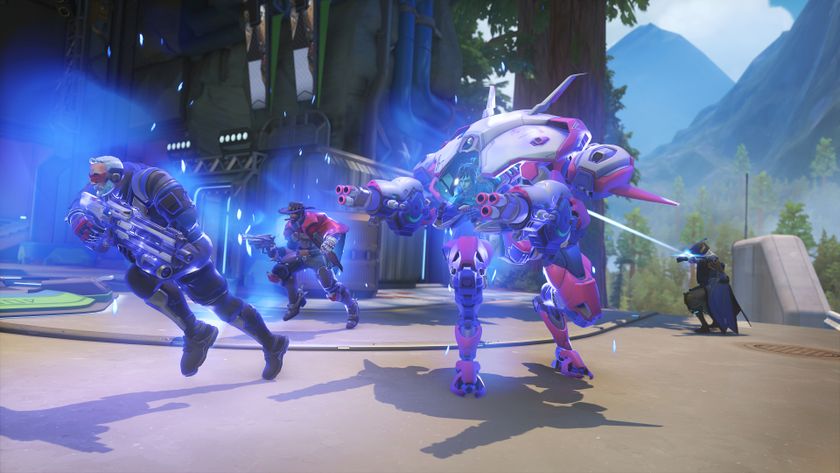
Overwatch 2's next seasons go hard after Marvel Rivals lit a fire under Blizzard: upgradeable perks, a big third-person mode, and loot boxes are all coming
